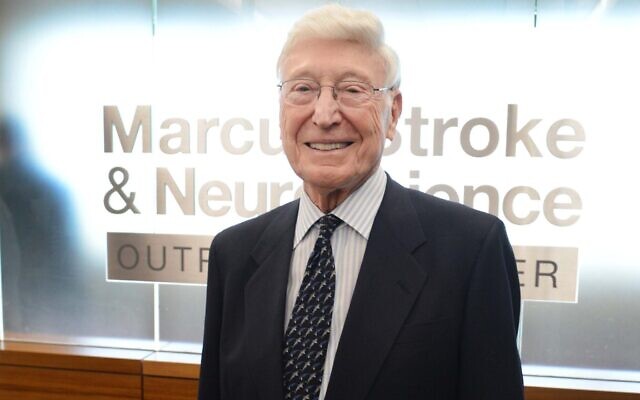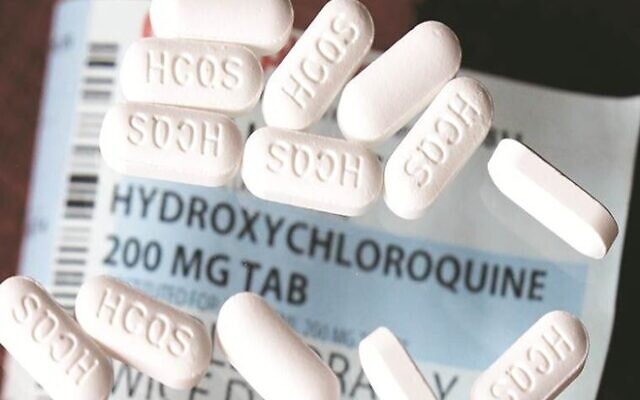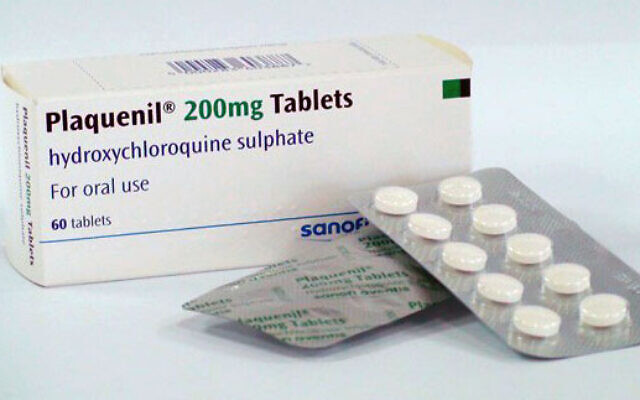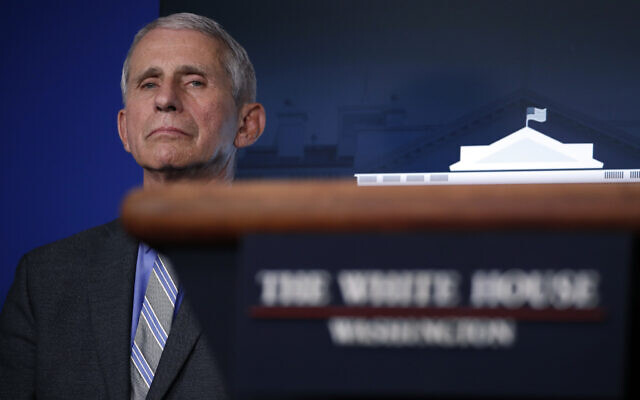Why Bernie Marcus Backs Campaign Behind Hydroxychloroquine Drug
As researchers conduct hundreds of clinical trials seeking COVID-19 treatments, an unapproved drug has received considerable attention and positive results.
Dave Schechter is a veteran journalist whose career includes writing and producing reports from Israel and elsewhere in the Middle East.

Among the controversies arising from the federal response to COVID-19 is the debate over hydroxychloroquine, a drug touted by President Donald Trump, despite it lacking approval by the Food and Drug Administration to treat the virus.
The group behind a campaign promoting hydroxychloroquine is the Job Creators Network, founded in June 2011 by Bernie Marcus, the co-founder of The Home Depot and a major contributor to Trump’s 2016 election campaign.

Marcus, whose philanthropy has included hundreds of millions of dollars for medical research and health care institutions, had his reasons for backing a campaign on behalf of an unapproved drug. He told the AJT, “I became involved in the Job Creators Network campaign advocating wider use of hydroxychloroquine for one reason, to get something out there that might work and had been successful in treating other illnesses. Now, we’ve found that it does have possibilities to achieve results on some people, but those with underlying conditions should stay away,” he said.
Marcus and JCN also played a role in shaping the portion of the $2.2 trillion COVID-19 stimulus bill enacted in late March that provided $349 billion for small businesses. According to a tax filing, the mission of the Job Creators Network, a 501(c)(4) nonprofit under the federal tax code, is to “educate Americans on the vital role of free enterprise in creating jobs that will spur innovation and help ensure America’s future economic success.”
On March 26, JCN launched an online petition drive, along with Facebook ads and blast text messages, calling on Trump to “cut the red tape” and make hydroxychloroquine available. A related entity, the Job Creators Network Foundation, was listed as sponsor of the campaign, along with another nonprofit, Physicians for Reform. The campaign was amplified by Fox News Channel hosts with some of the largest cable news audiences.
The petition told doctors that their signatures “will go directly to President Trump,” and it urged the president to “protect physician autonomy and medical decision-making as we stand in harm’s way to care for the American public.
“There is clear and ever-mounting evidence that the anti-malaria drug hydroxychloroquine can significantly help patients who contract coronavirus,” the petition stated.
On April 6, Trump said, “I’m not a doctor. But I have common sense. The FDA feels good about it. As you know, they’ve approved it, they gave it a rapid approval, and the reason [is] because it’s been out there for a long time, and they know the side effects and they also know the potential.”
There are no FDA-approved antiviral drugs to treat COVID-19 (the scientific designation SARS-CoV-2 stands for “severe acute respiratory syndrome coronavirus 2”).
When it issued COVID-19 treatment guidelines on April 21, a panel assembled by the National Institute of Allergy and Infectious Diseases recommended against use of a combination of hydroxychloroquine and azithromycin, an antibiotic, for the treatment of COVID-19 because of potential serious heart problems.
Chloroquine was developed in the 1930s to fight malaria, and hydroxychloroquine, which has fewer side effects, was developed during World War II.
 Hydroxychloroquine has FDA approval to treat autoimmune conditions such as lupus, and rheumatoid arthritis and other arthritic ailments. Pharmacists say the push to stockpile the drug has led to scarcity in some places and driven up its price.
Hydroxychloroquine has FDA approval to treat autoimmune conditions such as lupus, and rheumatoid arthritis and other arthritic ailments. Pharmacists say the push to stockpile the drug has led to scarcity in some places and driven up its price.
The FDA has given doctors emergency authorization for limited “off label” use of chloroquine and hydroxychloroquine to treat COVID-19 patients under limited circumstances, even though the drugs have not met the scientific standard for approval for that purpose, which includes peer-reviewed random clinical trials. In announcing a donation to the national stockpile of hydroxychloroquine, the federal Department of Health and Human Services said March 29 that “clinical trials are needed to provide scientific evidence that these treatments are effective.”
As of April 22, the website clinicaltrials.gov listed nearly 800 clinical trials related to COVID-19, 120 of which involved hydroxychloroquine.
Marcus was critical of the drug approval process. “The FDA has had the opportunity to loosen controls in the last few years for new drugs to be introduced to the market, but they have been slow. The influence of the President has sped things up to get drugs out there faster, as long as there is a strong feeling that it is not harmful to most people,” he told the AJT.
“It will be interesting to watch the FDA in the future. Will they change the process to the speed with which they are signing off on things during this pandemic? I hope they will continue to bring effective drugs to the market sooner rather than later. Many drugs that probably would be effective with extra caution have been kept off the market for too long. Doctors should have the ability to rely on their expertise and their knowledge of their patients to make the decision whether or not to use a drug, just like they always have.”
Asked to evaluate the federal response to COVID-19, including by the White House, Marcus told the AJT: “I am concerned about both the health safety and the economic safety of this country. As I said publicly on television, the impeachment had occupied everyone’s minds. Congress, both the Democrats and the Republicans, was focused on getting rid of the President.”
The House of Representatives began impeachment hearings on Dec. 4, 2019 and sent two articles of impeachment to the Senate on Jan. 15, 2020. The Senate voted on Feb. 5 to acquit Trump on both articles of impeachment.
China reported a coronavirus to the World Health Organization on Dec. 31. The Centers for Disease Control and Prevention issued its first warning on Jan. 8. The first confirmed COVID-19 case in the U.S., in Washington state, was reported on Jan. 20. Trump made his first public comment on Jan. 22, telling CNBC, “We have it totally under control. It’s one person coming in from China. We have it under control. It’s going to be just fine.”

Dr. Anthony S. Fauci, director of the National Institute of Allergy and Infectious Disease, told the New York Times on Feb. 2, “It’s very, very transmissible, and it almost certainly is going to be a pandemic. But will it be catastrophic? I don’t know.” The U.S. recorded its first coronavirus death on Feb. 29.
Marcus said, “In the meantime, Trump made the key decision to stop planes from coming in from China, which probably saved hundreds of thousands of lives. The press was not open to talking about this. And many political leaders and editorial boards said it was the wrong thing to do. In their minds, nothing he does is right.”
Trump announced restrictions on travel from China on Jan. 31. The New York Times and other news organizations have reported that in the two months after that announcement, 40,000 people flew from China to the United States, including thousands from the city of Wuhan, where COVID-19 is believed to have originated.
[Note: Marcus is the father of AJT publisher Michael Morris.]



comments